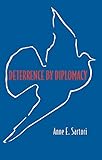Deterrence by Diplomacy / Anne E. Sartori.
Material type: TextPublisher: Princeton, NJ : Princeton University Press, [2013]Copyright date: ©2005Edition: Course BookDescription: 1 online resource (184 p.) : 7 line illus. 18 tablesContent type:
TextPublisher: Princeton, NJ : Princeton University Press, [2013]Copyright date: ©2005Edition: Course BookDescription: 1 online resource (184 p.) : 7 line illus. 18 tablesContent type: - 9780691134000
- 9781400849444
- 327.2 22
- JZ1305 .S37 2007eb
- online - DeGruyter
- Issued also in print.
| Item type | Current library | Call number | URL | Status | Notes | Barcode | |
|---|---|---|---|---|---|---|---|
 eBook
eBook
|
Biblioteca "Angelicum" Pont. Univ. S.Tommaso d'Aquino Nuvola online | online - DeGruyter (Browse shelf(Opens below)) | Online access | Not for loan (Accesso limitato) | Accesso per gli utenti autorizzati / Access for authorized users | (dgr)9781400849444 |
Frontmatter -- Contents -- Preface -- PART I. Introduction -- CHAPTER 1. Introduction -- PART II. How Bluffs Can Hurt a State's Diplomacy, and Honesty Provides the Ability to Communicate -- CHAPTER 2. The Failure of Chinese Diplomacy, 1950 -- CHAPTER 3. A Reputational Theory of Diplomacy -- PART III. Evidence That Honesty Matters -- CHAPTER 4. Reputations for Honesty and the Success of Diplomacy -- CHAPTER 5. The Broader Importance of Reputations for Honesty -- PART IV. Conclusion -- CHAPTER 6. Conclusion -- PART V. Appendixes -- APPENDIX A. Characterization of the Equilibrium -- APPENDIX B. The Impact of Communication on War and on Welfare -- APPENDIX C. Implications of the Theory -- APPENDIX D. The Effects of Power Status, Contiguity, and Democracy -- Bibliography -- Index
restricted access online access with authorization star
http://purl.org/coar/access_right/c_16ec
Why are countries often able to communicate critical information using diplomacy? Why do countries typically use diplomacy honestly, despite incentives to bluff? Why are they often able to deter attacks using merely verbal threats? International relations theory is largely pessimistic about the prospects for effective diplomacy, yet leaders nevertheless expend much time and energy trying to resolve conflicts through verbal negotiations and public statements. Deterrence by Diplomacy challenges standard understandings of deterrence by analyzing it as a form of talk and reaches conclusions about the effectiveness of diplomacy that are much more optimistic. Anne Sartori argues that diplomacy works precisely because it is so valuable. States take pains to use diplomacy honestly most of the time because doing so allows them to maintain reputations for honesty, which in turn enhance their ability to resolve future disputes using diplomacy rather than force. So, to maintain the effectiveness of their diplomacy, states sometimes acquiesce to others' demands when they might have been able to attain their goals through bluffs. Sartori theorizes that countries obtain a "trade" of issues over time; they get their way more often when they deem the issues more important, and concede more often when they deem the issues less important. Departing from traditional theory, this book shows that rather than always fighting over small issues to show resolve, states can make their threats more credible by sometimes honestly acquiescing over lesser issues--by not crying "wolf."
Issued also in print.
Mode of access: Internet via World Wide Web.
In English.
Description based on online resource; title from PDF title page (publisher's Web site, viewed 29. Jul 2021)


